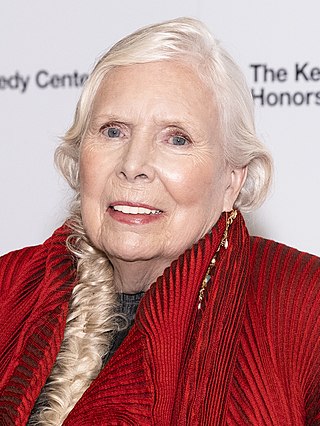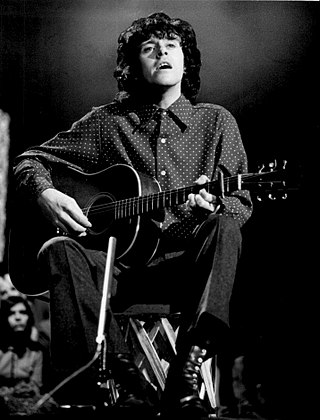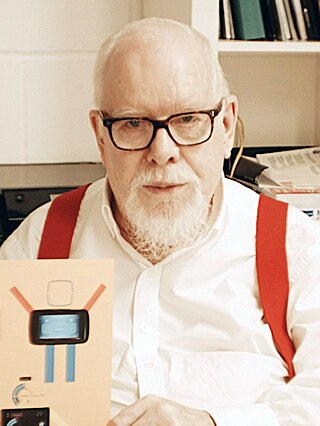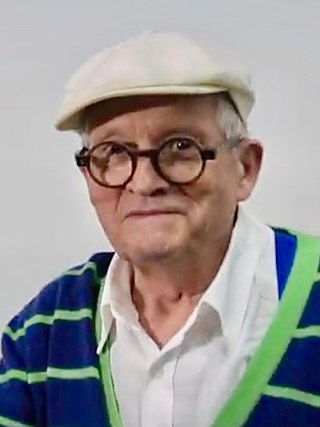
David Robert Jones, known professionally as David Bowie, was an English singer, songwriter, musician and actor. Regarded as one of the most influential musicians of the 20th century, Bowie was acclaimed by critics and musicians, particularly for his innovative work during the 1970s. His career was marked by reinvention and visual presentation, and his music and stagecraft has had a significant impact on popular music.

Roberta Joan "Joni" Mitchell is a Canadian-American singer-songwriter, multi-instrumentalist, and painter. As one of the most influential singer-songwriters to emerge from the 1960s folk music circuit, Mitchell became known for her personal lyrics and unconventional compositions, which grew to incorporate elements of pop, jazz, and other genres. Among her accolades are eleven Grammy Awards, and induction into the Rock and Roll Hall of Fame in 1997. Rolling Stone named her "one of the greatest songwriters ever", and AllMusic has stated, "Joni Mitchell may stand as the most important and influential female recording artist of the late 20th century."

The British Invasion was a cultural phenomenon of the mid-1960s, when rock and pop music acts from the United Kingdom and other aspects of British culture became popular in the United States with significant influence on the rising "counterculture" on both sides of the Atlantic Ocean. British pop and rock groups such as the Beatles, the Rolling Stones, Gerry and the Pacemakers, the Searchers, Billy J. Kramer and the Dakotas, Freddie and the Dreamers, the Merseybeats, the Dave Clark Five, the Hollies, Manfred Mann, Herman's Hermits, Peter and Gordon, the Animals, the Zombies, the Yardbirds, the Moody Blues, the Kinks, the Spencer Davis Group, Them, the Pretty Things, the Who, Small Faces, and the Bee Gees, as well as solo singers such as Dusty Springfield, Cilla Black, Petula Clark, Marianne Faithfull, Tom Jones, and Donovan were at the forefront of the "invasion."

Beck David Hansen, known mononymously as Beck, is an American musician, singer, songwriter, and record producer. He rose to fame in the early 1990s with his experimental and lo-fi style, and became known for creating musical collages of wide-ranging genres. He has musically encompassed folk, funk, soul, hip hop, electronica, alternative rock, country, and psychedelia. He has released 14 studio albums, as well as several non-album singles and a book of sheet music.

Donovan Phillips Leitch, known mononymously as Donovan, is a Scottish musician, songwriter and record producer. He emerged from the British folk scene in early 1965, and subsequently scored multiple international hit singles and albums during the late 1960s. His work became emblematic of the flower power era with its blend of folk, pop, psychedelica, and jazz stylings.

David Royston Bailey is an English photographer and director, most widely known for his fashion photography and portraiture, and role in shaping the image of the Swinging Sixties. Bailey has also directed several television commercials and documentaries.

Sir Peter Thomas Blake is an English pop artist. He co-created the sleeve design for the Beatles' 1967 album Sgt. Pepper's Lonely Hearts Club Band. His other works include the covers for two of The Who's albums, the cover of the Band Aid single "Do They Know It's Christmas?", and the Live Aid concert poster. Blake also designed the 2012 Brit Award statuette.

David Hockney is an English painter, draughtsman, printmaker, stage designer, and photographer. As an important contributor to the pop art movement of the 1960s, he is considered one of the most influential British artists of the 20th and 21st centuries.

Throughout the history of the British Isles, the land that is now the United Kingdom has been a major music producer, drawing inspiration from church music and traditional folk music, using instruments from England, Scotland, Northern Ireland, and Wales. Each of the four countries of the United Kingdom has its own diverse and distinctive folk music forms, which flourished until the era of industrialisation when they began to be replaced by new forms of popular music, including music hall and brass bands. Many British musicians have influenced modern music on a global scale, and the UK has one of the world's largest music industries. English, Scottish, Irish, and Welsh folk music as well as other British styles of music heavily influenced American music such as American folk music, American march music, old-time, ragtime, blues, country, and bluegrass. The UK has birthed many popular music genres such as beat music, psychedelic music, progressive rock/pop, heavy metal, new wave, and industrial music.

Roy Harper is an English folk rock singer, songwriter, and guitarist. He has released 22 studio albums across a career that stretches back to 1966. As a musician, Harper is known for his distinctive fingerstyle playing and lengthy, lyrical, complex compositions, reflecting his love of jazz and the poet John Keats.

Hunky Dory is the fourth studio album by the English musician David Bowie, released in the United Kingdom on 17 December 1971 through RCA Records. Following a break from touring and recording, Bowie settled down to write new songs, composing on piano rather than guitar as in earlier works. Bowie assembled Mick Ronson (guitar), Trevor Bolder (bass) and Mick Woodmansey (drums), and began to record a new album in mid-1971 at Trident Studios in London. Rick Wakeman contributed piano shortly before joining Yes. Bowie co-produced the album with Ken Scott, who had engineered Bowie's previous two records.

Michael Scott is a Scottish singer, songwriter, and musician. He is the founding member, lead singer, guitarist and songwriter of rock band The Waterboys. He has also produced two solo albums, Bring 'Em All In and Still Burning. Scott is a vocalist, guitarist and pianist, and has played a large range of other instruments, including the bouzouki, drums, and Hammond organ on his albums. Scott is also a published writer, having released his autobiography, Adventures of a Waterboy, in 2012.
Psychedelic folk is a loosely defined form of psychedelia that originated in the 1960s. It retains the largely acoustic instrumentation of folk, but adds musical elements common to psychedelic music.

Kate Victoria "KT" Tunstall is a Scottish singer-songwriter and musician. She first gained attention with a 2004 live solo performance of her song "Black Horse and the Cherry Tree" on Later... with Jools Holland. She has released eight studio albums internationally: Eye to the Telescope (2004), Drastic Fantastic (2007), Tiger Suit (2010), Invisible Empire // Crescent Moon (2013), Kin (2016), Wax (2018), Nut (2022), and a collaboration album with American musician Suzi Quatro, Face to Face (2023). She has also appeared in two episodes of the comedy series This is Jinsy on Sky Atlantic.

I'm Not There is a 2007 musical drama film directed by Todd Haynes, who co-wrote the screenplay with Oren Moverman, based on a story by Haynes. An experimental biographical film, it is inspired by the life and music of American singer-songwriter Bob Dylan, with six actors depicting different facets of Dylan's public personas: Christian Bale, Cate Blanchett, Marcus Carl Franklin, Richard Gere, Heath Ledger, and Ben Whishaw. A caption at the start of the film declares it to be "inspired by the music and the many lives of Bob Dylan"; this is the only mention of Dylan in the film apart from song credits, and his only appearance in it is concert footage from 1966 shown during the film's final moments.

Mumford & Sons are a British folk rock band formed in London in 2007. The band consists of Marcus Mumford, Ted Dwane, and Ben Lovett. Banjoist Winston Marshall played on the band's first four albums before his departure in 2021.

John Patrick Vivian Flynn is a British actor and musician. He starred as Dylan Witter in the Channel 4 and Netflix television sitcom Lovesick and has also portrayed David Bowie in the 2020 film Stardust and a young Nicholas Winton in the 2023 film One Life.

Jermaine Sinclaire Scott, better known by his stage name Wretch 32, is a British rapper, singer and songwriter from Tottenham, North London. He was a member of the grime collective Combination Chain Gang, before forming The Movement with Scorcher, Ghetts, and Mercston.
The historic county of Sussex in Southern England has a rich musical heritage that encompasses the genres of folk, classical, rock, and popular music amongst others. With the unbroken survival of its indigenous music, Sussex was at the forefront of the English folk music revivals of the 19th and 20th centuries. Many classical composers have found inspiration in Sussex, and the county continues to have a thriving musical scene across the musical genres. In Sussex by the Sea, the county has its own unofficial anthem.

Kim Danila Shillinglaw is a British media executive and non-executive director. A former controller of BBC Two and BBC Four, head of science and natural history commissioning at the BBC, and commissioner for children's entertainment at CBBC, she later became director of factual businesses at Endemol Shine. She is known for having transformed popular science on television.


















